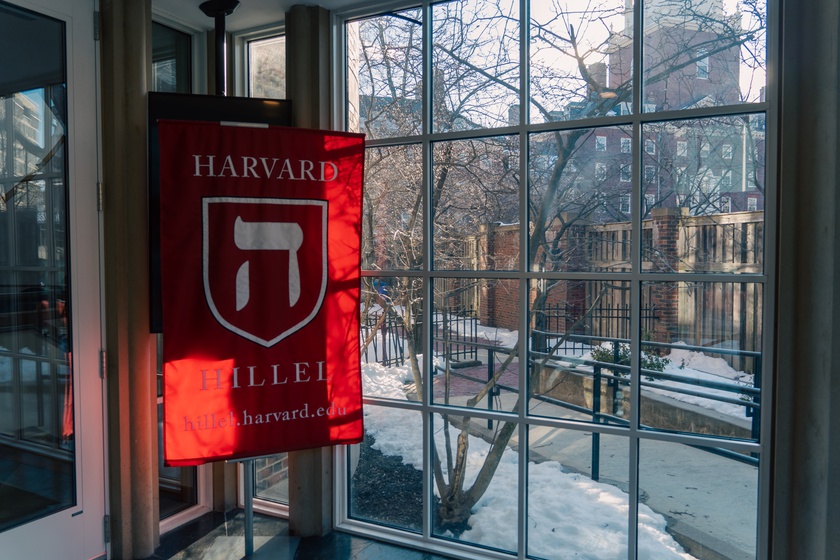{shortcode-c3f4460989a8f5db3827e94f7ce2ed2dcd73cd26}
In the beginning, the story goes, God made the heavens and the earth. God made day and night, put stars in the sky and plants in the dirt. And on the seventh day, God was tired. So God rested.
“God rests. What does that mean?” asks Jamie G. Drucker, who works as the Student Activities Director and Reform Community Advisor at Harvard Hillel. I asked Jaime to talk to me about Shabbat, the Jewish day of rest that occurs every week, from sundown Friday to sundown Saturday. Observing Shabbat is the fourth of the ten commandments.
I met her a few weeks ago during a lunch at Rabbi Dani’s house. The Rabbi said something interesting, and I wanted to write it down. “Does anyone have a pen?” I asked loudly, probably a little obnoxiously. Jaime leaned over and whispered in my ear, “Just so you know, some people here don’t write on Shabbat.”
The specificity of these rules has been lost to me over the years post-graduating Jewish preschool. Jaime reminds me: No phone, no laptop. No writing, no electricity. According to the Torah, these activities do not qualify as rest. “You can’t find me. I don’t have to answer any of my emails. I’m free not only of the task, but of the burden of the task. It’s just gone,” she says. Wow, I think. That sounds really nice, actually.
Jaime grew up in Florida in a relatively unobservant Jewish family. “My sister calls us ‘bagel and lox Jews,’” she says. In college at the University of Florida, she studied religion with a focus on Islam. “I was doing all this research and asking these people about themselves and their relationship with their religion, and someone just very kindly asked me, ‘What about you?’”
“It just felt like: Whoosh. There is something dishonest about that, to not have asked myself the same things I’m asking other people,” Jaime says. That realization began her journey of religious inheritance. “Maybe I do want to live by these things,” she remembers thinking. “What’s my next opportunity to live by this?
After graduating college, Jaime came to the Divinity School to continue her religious education, where, in a class with Jon Levenson, she was “rocked by commandedness.”
“They say when the Torah was revealed it said: ‘we will do and we will understand.’ The way we talk about the Torah is, you have a certain kind of trust that you will just do the thing, and in doing it, you live your way into understanding why.”
So Jaime started doing exactly that. During the beginning of the pandemic, she began the weekly practice of observing Shabbat. She cherished Shabbat meals with her pandemic pod. “Especially with Zoom and Covid, it made that day feel meaningful when the rest of the week felt weird,” she says.
So does it work? After Shabbat, does she feel rested? Turns out it’s a little more complicated than that. “I don’t know if I feel rested,” she begins. “It’s just a reminder that I am a person apart from the things that I do, and that’s a big part of Shabbat too. You’re not allowed to create or destroy… You just marvel at the world as it is, and maybe lament that the world is not as it could be. So that is a great reset. But we live in the world. We live in the world as much as we live in Shabbat.”
Oftentimes, in the wake of the sabbath, Jaime feels heartbroken. “People talk about the Sunday scaries or whatever?” she says with a laugh. “I get so sad every week.”
Jaime jogged another distant Hebrew school memory about the closing ceremony of Shabbat on Saturday evening, called Havdalah. Havdalah literally means separation, and she explains that it’s intended to honor the division between the week and the sabbath. “Every day is not supposed to be Shabbat. Some people say you bring little pieces of Shabbat into your week, that’s fine. There is a sacredness in separation, though,” she says.
I appreciate the tangible boundary Havdalah provides when considering the everyday and the holy, work and rest. And I appreciate that the ritual of Shabbat punctuates the rhythm of the week with some stillness.
The way I’m following it thus far, part of religious connection comes from doing with the trust that in that doing, there will come an understanding of why. But isn’t that paradoxical: we’re being commanded to rest, and in following that commandment, we are doing, which is, in fact, the opposite of rest?
Jaime acknowledges this dissonance: “Maybe it’s hard, but I think rabbis [and] God, they’re smart. They get that it’s hard to be a person. It’s hard to rest. So we’re going to command you to rest, because it’s in the fabric of the universe, as the creation story tells us. And because otherwise we won’t.”
Sitting across from my friend Jeremy O.S. Orenstein ’24 in the dining hall, we’re talking about Judaism and how awesome rest is. He says, “Let’s do it this weekend! Come on! Let’s celebrate Shabbat!” He really said this. I check my calendar: I can’t this weekend. I’m taking some kids on a field trip to the aquarium and I definitely need my phone for that.
— Associate Magazine Editor Maya M. F. Wilson can be reached at maya.wilson@thecrimson.com.


